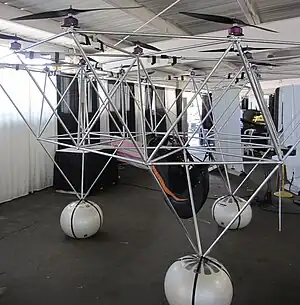Volocopter VC2
The Volocopter VC2 is a German single-place experimental electric multirotor personal air vehicle that was built by Volocopter GmbH (formerly called E-Volo) of Bruchsal, Germany.[1]
| VC-2 | |
|---|---|
 | |
| Role | Multirotor, personal air vehicle |
| National origin | Germany |
| Manufacturer | Volocopter GmbH |
| First flight | November 2013 |
| Introduction | 2012 |
| Status | In development |
| Developed from | E-volo VC1 |
| Variants | Volocopter 2X |
Design and development
The VC-2 is the second in a series of multirotor designs from the German company e-volo. The single-place, 16 motor, all-electric e-volo VC1 "Volocopter" was demonstrated on 21 October 2011. The VC2 is the next follow-on with 18 engines suspended around an aluminum truss frame that includes a center-mounted seat, battery, and Battery Management Unit. The proof-of-concept aircraft will be used to develop the E-volo VC Evolution 2P, a two-passenger enclosed volocopter with extended range and weight capabilities.[2]
The VC200 was demonstrated unmanned in November 2013 at an enclosed arena in Karlsruhe, Germany.[3][4][5] Two prototypes performed unmanned flight tests, with the first manned flight made on March 30, 2016, by Alexander Zosel.[6][7]
Specifications
Data from EAA, Manufacturer
General characteristics
- Crew: one
- Powerplant: 18 × Direct drive electric, 2 kW (2.7 hp) each
- Propellers: two-bladed
| External image | |
|---|---|
See also
References
- "e-volo VC2 to Make World Debut at AirVenture". Retrieved 11 July 2012.
- "The world premiere of the VC2 at AirVenture in Oshkosh/USA". Retrieved 11 June 2012.
- "REVOLUTIONARY GREEN HELICOPTER MAKES MAIDEN FLIGHT" Press Release, Vertical Magazine 21 November 2013. Accessed: 21 November 2013.
- "Volocopter". e-volo.com. Retrieved 8 April 2016.
- "First Flight For Two-Seat Electric Rotorcraft". Retrieved 21 November 2013.
- "World Premiere: Volocopter is Flying Manned! - Dawn of a Revolution in Urban Mobility". Yahoo Finance. 7 April 2016. Retrieved 8 April 2016.
- "First Manned Flight For Volocopter". avweb.com. Retrieved 8 April 2016.